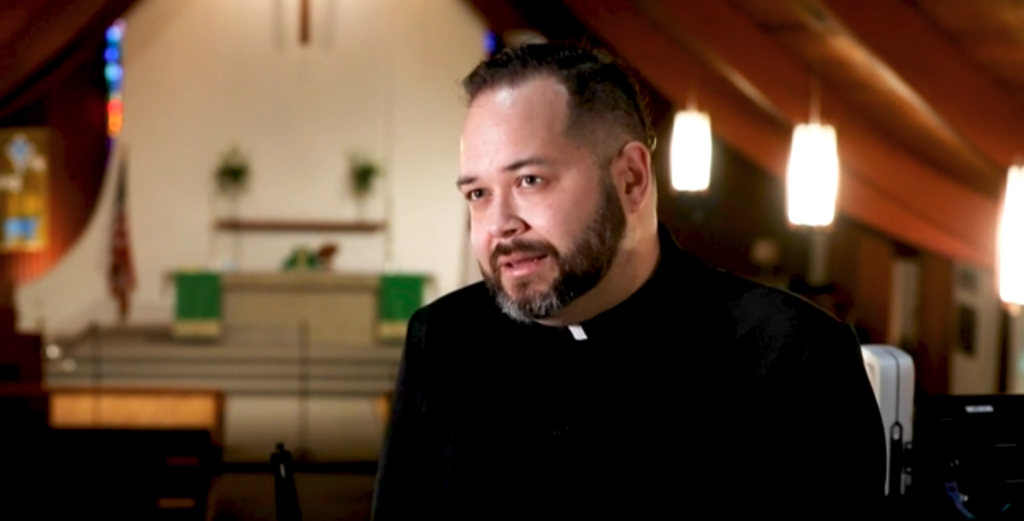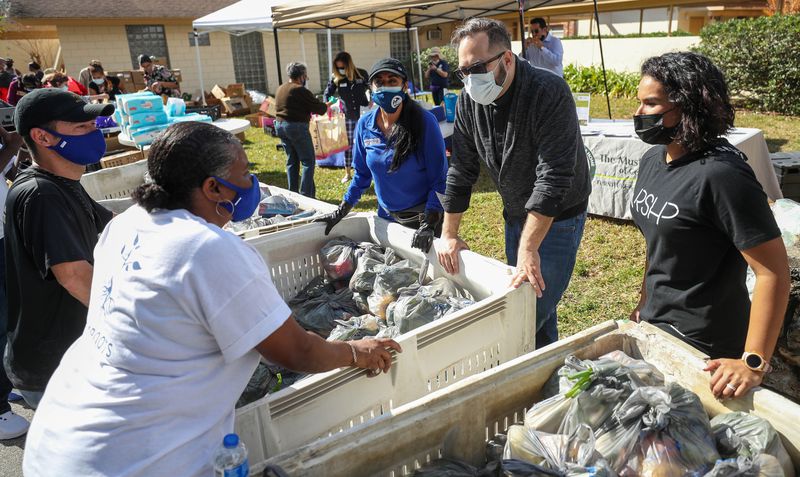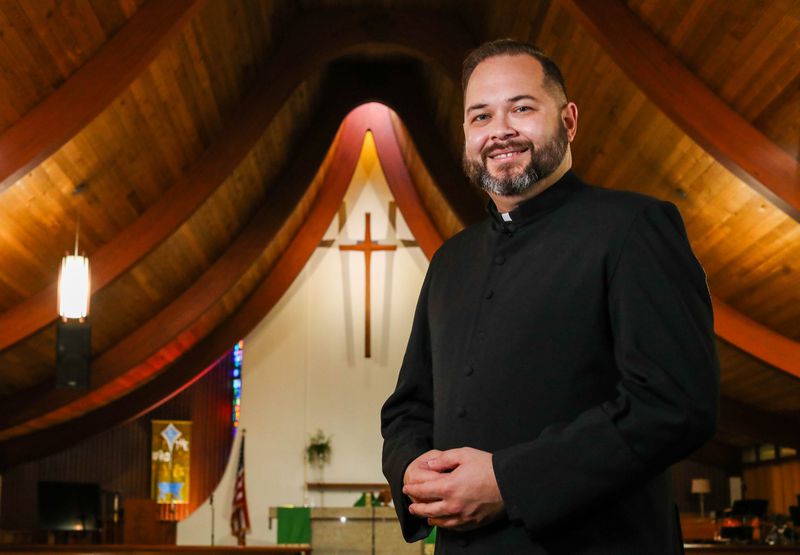After his family migrated from Puerto Rico to Connecticut and later to Florida, José Rodríguez was raised in a modest home empty of luxuries but full of love and compassion. He had one job growing up: graduating from college. His mom was a labor leader who was very active with her union. His dad had a 30-year military life with “two or three jobs at a time to make sure he gave us a future, to make sure we had a house and see that I become the first in the family to go to college,” Rodríguez recalled. To this day he remembers Hartford’s cold winters, and the struggles they endured when the family lacked food to eat or warm clothing to wear.
He learned life was all about working hard, being true to yourself and always extending a helping hand. Decades later, now an Episcopal priest, he is not only paying it forward but is committed to eradicating economic disparities and see to it Central Florida provides underserved families with good jobs and a “decent roof over their heads.”
Rodríguez has been an advocate for equality and justice for the community he serves, managing a pantry at his church that each month provides at least a week’s worth of food for families in need. He’s become known as “the father of the diaspora” to those who had to leave their homeland and migrate to the continental U.S., many as climate refugees. Because of his commitment and his fighting spirit on behalf of those who need help, Rodríguez is one of the six finalists for the Orlando Sentinel’s 2020 Central Floridian of the Year award.

Growing up, Rodríguez always knew that staying true to his Hispanic roots would take him far in life. He knew Spanish but was often one of the few Latinos in his class. He completed high school and, as his father had hoped, went to college. Rodríguez has a full-time job with the federal government and is a “part time priest,” even though he puts in long hours of service. Because he is an Episcopal priest, Rodríguez was able to marry. His wife and two kids constantly help him out with his “church duties.”
Rodríguez decided in 2007 to devote his life to the service of God. He was young, recently married and managing debt collections for a financial institution. “I worked with a lot of broken people, people who were broken by the economy,” he said. He recalls how one night he talked to his wife and told her he wanted to quit. “So it is in this job, being young, being recently married, taking people’s homes away, taking people’s cars away, hearing people come to me crying, hearing their stories of brokenness, that I am like, ‘I can’t do this. I can’t be part of breaking people.’ And I started feeling a calling to help fix people.”
Rodríguez quit his job, went back to college to get his MBA and then went into full-time seminary to become a priest. “I can tell you; I didn’t wake up one morning and said I want to be a priest. It kind of happened the same way that my Hispanic leadership happened. People came to me and said, ‘We see this in you, would you walk with us?’”
The Hurricanes that changed it all
While some know Rodríguez for his activism with the Hispanic community, it wasn’t until Hurricane Irma menaced Florida in 2017 that he had to roll up his sleeves and be there for his community, something beyond giving “a nice Sunday sermon.” He had been hearing about immigrants needing shelter and being afraid to find help because counties were asking for IDs. He started finding shelter, food and clothes for them.
Two weeks later, Hurricane María, a catastrophic Category 4 hurricane, changed the lives of thousands of Puerto Ricans and others from the Caribbean. Rodríguez says that was the moment God was preparing him for his entire life. He had recently been appointed to cover for a priest who had just retired at the Jesus of Nazareth Episcopal Church in Azalea Park, an area in southeast Orange County with a 64% Hispanic population.
His sermons at first were in “broken Spanish or Spanglish,” but soon enough, with an unimaginable exodus of boricuas — people from Puerto Rico — arriving at Orlando International Airport, his church became a safe haven, a place they could find food and shelter. Rodríguez remembers getting a call from state Rep. Carlos Guillermo Smith, who invited him to the makeshift welcome center at the airport. “Hurricane Irma changed me,”Rodriguez said. But it wasn’t until he went to Orlando International Airport, the day María refugees were arriving for the first time, that he realized the full weight of mission he had upon him.
The people getting off the planes had nothing, Rodríguez said. “I will always remember the first person that came to me asking me for something. She was asking me for sanitary pads because she had her period and she didn’t have a pad. Do you know what it takes for a woman to see a priest and the first thing that comes to her mind is to ask for a sanitary pad?” he asked. “That changed everything about the ministry I would be doing up until today.”
After that, newcomers started flocking to his church, regardless of their religious affiliation, because they knew the priest there would help find food, a place to stay and a warm meal. In the three years since Hurricane María, Rodríguez and his church community have raised money to help families pay for power and water bills. They’ve paid rent for those about to be kicked out of their apartments and bought furniture for those who had a place to stay but no bed to sleep on.

Latinos become the essential employees
Just when it seemed that the newcomers were getting settled, a pandemic upended life again, testing his faith and ministry. The Latino community, especially those from ZIP codes surrounding his church, were hit the hardest.
“Not only were the Latinos and Blacks at most risk of contracting the virus, they were also disproportionately uninformed,” Rodríguez said. A lack of information in Spanish and resources for them was the main problem. It wasn’t until late April, facing pressure from Rodríguez and others, that Orange County began holding bilingual press briefings.
COVID cases were ramping up and “we needed to do something. We can’t abandon them. They are now the essential employees risking their lives,” Rodríguez said about Latinos working at restaurants and farms. Rodríguez acknowledges the accomplishments so far in the community he serves, but says a lot of work remains ahead.
For him, affordable housing and well-paying jobs is the key to “equal access to opportunity. Some argue that is a government’s job and not the duty of the church, but Rodríguez said he can’t spend his ministry “focused on would’ve, could’ve, should’ve…So reality right now in Azalea Park is people don’t have homes. People don’t have food on the table. People don’t have jobs. “It is not my calling to set out a table, write letters and say they need that. It is my calling to lift other people up and go do something about it.”
This is one in a series of stories about the six finalists for 2020 Central Floridian of the Year. Read about others at OrlandoSentinel.com/CFOTY.
